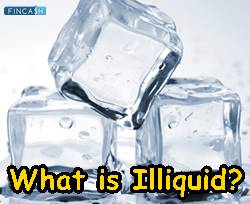
Table of Contents
Illiquid
What is Illiquid?
Illiquid can be defined as the state of certain securities and assets that can neither be sold nor exchanged for a good price. In simple terms, you cannot convert these stocks and assets into cash. The most common reason for illiquidity in the stock Market is the uninterested traders and lack of investors who are willing to invest in the company’s shares. That’s the reason why illiquid assets are not sold as easily as other assets.

Moreover, they have a small trading volume and high Volatility rate. Another common reason for illiquidity is the differences between the asking price and bids. Sometimes, a seller sets a high price for the product. If the buyer doesn’t find the product valuable enough or its price seems to be too high, then they don’t place a bid for that product. It is also possible for buyers to place a bid that’s extremely lower than the asking price.
Overview of Illiquidity
The lack of interested investors in the market or the low demand for the particular asset can put the owner of the asset at high risk for losses. The assets become illiquid when the investor is trying to exchange the assets for cash quickly, but investors are not interested in the offer.
If you see it in the business context, then illiquidity would simply refer to a company that is unable to meet its cash flow requirements. As a result, they can’t pay their debts and interests on time. Note that an illiquid company doesn’t necessarily mean a company without any assets at all. In fact, all sizes of businesses have certain equipment, tools, and property. If they were to sell it to the interested buyer, they would be able to make enough profit.
However, these assets can’t be sold until you decide to close your business.
Talk to our investment specialist
With that being said, no company wants to sell the illiquid assets. They are rather supposed to sell certain assets when they require money to maintain the cash flow or save the company from Bankruptcy and foreclosure. Usually, when a company sells the products in an emergency, they end up disposing of the assets at a price much lower than the original value of the asset.
Can a Business get Illiquid?
A company is declared as illiquid when it doesn’t have sufficient funds to meet the debt obligations. The common examples of illiquid assets include your property, cars, art pieces, and other valuable assets that are not sold for business purposes.
The OTC stocks have relatively lower liquidity as compared to the stocks that are being sold by popular companies or the ones that are listed on reputable exchanges. The reason for the illiquidity of the over the counter stock is simple. These stocks are sold in a marketplace that has fewer investors that are willing to spend on these assets. A majority of investors like to purchase stocks listed on popular exchanges since they have a low volatility rate. Trading time can also affect the liquidity of an asset.
All efforts have been made to ensure the information provided here is accurate. However, no guarantees are made regarding correctness of data. Please verify with scheme information document before making any investment.




